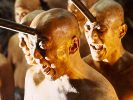Eye For Film >> Movies >> Tetsuo II: Body Hammer (1992) Film Review
Less a sequel than an alternative reimagining of Tsukamoto Shinya's punkishly provocative Tetsuo (1989) – which, after all, ended with the imminent destruction of Tokyo - Tetsuo II: Body Hammer gives a completely different interrelationship and back story to its chief antagonists (still played by Taguchi Tomorowo and Tsukamoto), and swaps the original's black and white for some queasily filtered colours.
The hyperactive editing and impenetrable plotting is less prominent, replaced by relatively sedate camerawork and an almost conventional Oedipal storyline – but Tsukamoto's preoccupations with meta(l)morphosis, body horror and unchecked masculinity remain firmly in place, as does the writer/director's way with outrageous images and ideas.

In a concrete underpass late at night, Yatsu (Tsukamoto) - a weedy-looking man with a cleft lip – shoots dead a drunken salaryman using only his bare fingers. Meanwhile, mild-mannered Taniguchi Tomoo (Taguchi) wakes from a dream that he was a child once again, standing in a field with his parents – even though this is the first time he has remembered anything about them since he was mysteriously removed to a foster family at age eight. "It was a wonderful dream," Taniguchi explains to his wife Kana (Kanaoka Nobu) and young son Minori (Tomioka Keinosuke) at the breakfast table of their elegantly minimalist apartment. "Peaceful too."
That sense of peace, however, is soon disrupted as two hulking strangers in trenchcoats shoot Taniguchi point blank in the chest with a strange device and abduct his son. If bespectacled Tanaguchi is like a Japanese Harold Lloyd, then it seems apt that he will soon find himself dangling from a building, while his persecutors taunt him and menace Minori. So no sooner than Tanaguchi, pushed literally to the edge, has let the uncharacteristically aggressive words "I'll kill you!" pass his lips then, for the second time that day, something dormant deep inside him begins to come to the surface. It is a destructive power, a power that he shares with Yatsu, and that will bring these two men together - again - in search of a traumatic past long forgotten, and a future where "something's going to be destroyed".
This will involve a mad scientist (Utazawa Torauemon), a private army of shaven-headed, iron-pumping cultists and an arsenal of human weapons, as Tsukamoto welds together elements from the SF dystopias of David Cronenberg's Scanners (1981) and Videodrome (1983) to explore the legacy of latent aggression, bordering on fascism, that he perceives underlying Japan's urban, middle-class males.
For Yatsu and, especially, Tanaguchi have all the unprepossessing appearance of Japanese everymen, but they are also the (hyperphallic) worms that turn, transformed into machines of destruction by their family history of violence (seen in disturbing sepia-toned flashbacks) and their barely concealed rage at the present. Shot through cool blue lenses, Tsukamoto's Tokyo is a place of sterile alienation, and when Taganuchi is eventually granted his dream of a peaceful family life, it will be at the cost of the city itself.
"He felt the beauty in destruction," Yatsu says of Tanaguchi. "That scared him, and he lost his memory." Yet even if the narrative that builds up to this film's rampaging climax is occasionally corroded by improbable coincidences and meandering repetitions, few will be able to forget the shocking beauty of its final images.
Reviewed on: 27 Jun 2012

















